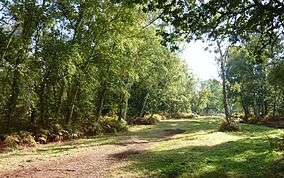Holme Fen
Holme Fen is a 266-hectare (660-acre) national nature reserve (NNR) near Holme, a village in Cambridgeshire, England. Situated at the westernmost end of the East Anglian fens, Holme Fen occupies a crescent-shaped site approximately 2.5 kilometres (1.6 mi) long by 1.5 kilometres (0.93 mi) wide. It has been designated as a Site of Special Scientific Interest (SSSI) and Nature Conservation Review Site (NCR). It is home to a variety of birds, including the Eurasian siskin, Nightingale and Lesser redpoll, and around 450 species of fungi.[1]

Holme Fen is the largest Silver birch woodland in lowland Britain. It contains approximately 5 hectares of rare acid grassland and heath and a hectare of remnant raised bog, an echo of the habitat that would have dominated the area centuries ago. This is the most south-easterly bog of its type in Britain.
Holme Fen, specifically Holme Posts, is believed to be the lowest land point in Great Britain at 2.75 metres (9.0 ft) below sea level.[1][2]
Access
The reserve is open to the public throughout the year.
Management
Holme Fem is at the south-western edge of the former Whittlesey Mere, which has been drained. The Great Fen Project aims to reconnect Holme Fen with nearby Woodwalton Fen, another vestigial fragment of wild fenland. Holme approximately marks the south-western limit of Stage 2 of the Great Fen Project.
References
- 1 2 "Holme Fen NNR". 2008.
- ↑ "UK's lowest spot is getting lower". BBC. 2002-11-29. Retrieved 2010-01-05.
Coordinates: 52°29′06″N 0°13′34″W / 52.485°N 0.226°W